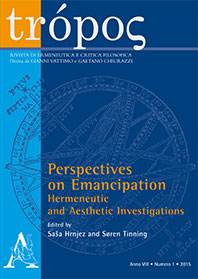Estratto da
TRóPOS
Perspectives on Emancipation. Hermeneutic and Aesthetic Investigations
L’invenzione dell’interiorità. Michel Foucault e la costruzione del soggetto cristiano
TRóPOS
Perspectives on Emancipation. Hermeneutic and Aesthetic Investigations
L’invenzione dell’interiorità. Michel Foucault e la costruzione del soggetto cristiano

ENGLISH TITLE: The invention of interiority. Michel Foucault and the making of the Christian subject
ABSTRACT: Michel Foucault’s lectures on Christian hermeneutics and technologies of the Self are crucial for at least two reasons. First of all, through the study of the religious practices of confession and the notion of regime of truth, the French philosopher comes to conclude the genealogy of the western subject which he had been already developing for years. The second issue involves the active role of the subject in the relationships between power and truth. Foucault finds out that the practices of confession, since the end of the second century, have been focused on the subject’s obligation to perform reflected acts of truth. In other terms, in such rituals subject would be compelled to tell the truth about himself and tie himself to it. As a consequence, the truth he tells about himself becomes indeed the norm in accord to which he will always be compelled to behave. Therefore, Foucault argues, the Christian subject is not free at all, but prisoner of his own identity. How can he release himself? This is the question to which Foucault will try to answer in the last years of his life through the deep analysis of the technologies of the Self developed by the ancient Greek and Roman philosophers.
KEYWORDS: Michel Foucault, Christianity, Confession, Subjectivity, Truth.
ABSTRACT: Michel Foucault’s lectures on Christian hermeneutics and technologies of the Self are crucial for at least two reasons. First of all, through the study of the religious practices of confession and the notion of regime of truth, the French philosopher comes to conclude the genealogy of the western subject which he had been already developing for years. The second issue involves the active role of the subject in the relationships between power and truth. Foucault finds out that the practices of confession, since the end of the second century, have been focused on the subject’s obligation to perform reflected acts of truth. In other terms, in such rituals subject would be compelled to tell the truth about himself and tie himself to it. As a consequence, the truth he tells about himself becomes indeed the norm in accord to which he will always be compelled to behave. Therefore, Foucault argues, the Christian subject is not free at all, but prisoner of his own identity. How can he release himself? This is the question to which Foucault will try to answer in the last years of his life through the deep analysis of the technologies of the Self developed by the ancient Greek and Roman philosophers.
KEYWORDS: Michel Foucault, Christianity, Confession, Subjectivity, Truth.
| pagine: | 203-221 |
| DOI: | 10.4399/978885488594311 |
| data pubblicazione: | Giugno 2015 |
| editore: | Aracne |








